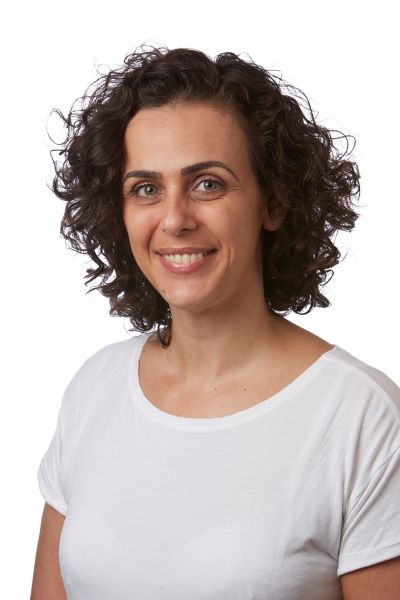The Brazilian with spine

Having only recently arrived at ARMI, Hozana Castillo has already mastered the institute’s commercial size coffee machine. “Melbourne and I have two things in common,” she told us. “We both know what real coffee is.”
Hozana is an early career postdoc and a Science Without Borders scholar from Brazil. After accepting a position at ARMI, Hozana will make Melbourne her home in 2016.
Hozana finished her PhD in 2010 at the University of São Paulo, Brazil. The focus of her PhD was studying the spinal cord in mouse and chick models.
“My PhD project focused on studying an enzyme that regulates retinoic acid production within the spinal cord. So I guess naturally, I really wanted to keep on working on the spinal cord after my PhD.”
After she graduated and began working in research laboratories, Hozana’s research interest eventually skewed towards better understanding spinal cord regeneration and what regulates this process. However, the opportunity to study this further did not arise easily.
‘In Brazil, there are no labs dedicated to studying spinal cord regeneration. So if I wanted to work on something I really liked, I had to leave Brazil. I just had to choose a country. I looked at some labs in India, UK and the US that did that type of research, but it was the work conducted by Yona Goldshmit, Jan Kaslin and Peter Currie at ARMI and the really cool stuff that they were doing that got me interested in the idea of going to Australia and working at ARMI,” said Hozana.
To Hozana’s delight, a delegation of scientists from ARMI were in Brazil in 2014 to participate in the Brazil-Australia Symposium on Development & Regenerative Medicine workshop. Among those who went were Mauro Costa and Milena Furtado, both Brazilians themselves, and the now Director of ARMI, Professor Peter Currie. The aim of the symposium was to explore potential collaborations between both countries.
“I wrote an email to Peter some time later to let him know that I would love to work on spinal cord regeneration. He kindly introduced me to Jan Kaslin, who is a keen spinal cord researcher and Group Leader at ARMI. Over time we had many Skype chats about possible project ideas and eventually we wrote a project proposal together, which was accepted and voilà, I’m here!” declared Hozana with glee.
Being ARMI’s first Brazilian postdoc that is funded by the Brazilian Government’s Science Without Border’s program, Hozana hopes to make a big impact with the research that she will do, and to return to Brazil with testimonials about her experience encouraging others to follow in her footsteps.
“Right now, I feel like Australia is increasing its scientific collaborations more intensely with South America, particularly Brazil, and I find that great. I would definitely recommend other Brazilian researches, whether they want to start a PhD or are early career postdocs, to get this sort of international exposure. I truly believe that an international research experience ensures we will be able to look at science from different angles, in the different environments and this will create far greater opportunities for the individual as well as the science,” says Hozana.
“Research isn’t done that differently in Brazil as compared to Australia. But the biggest difference has to be that the science community in Brazil is much smaller than in Australia. I can see how the greater diversity and larger networks in Australia definitely influences research development and outcomes. There are very strong academic groups here who have plenty of discussions between research groups within ARMI and amongst the larger research sector in Australia. The advanced infrastructure and technology available to me at ARMI is very important. I think I would be able to conduct my science research here faster than in Brazil.”
But no matter how good the research is in Australia, Brazil will always be home for Hozana and she says she like to go back to Brazil at the end of her scholarship.
“Leaving Brazil wasn’t actually too hard. Like most scientists, I had to move around for my PhD and work. One of the biggest changes I had to get used to in Australia is the time difference and working around it to call my family.”
Upon her return to Brazil, Hozana dreams of starting her own lab and bringing back to Brazil a wealth of knowledge, skills and a professional network that she has gained from her Australian experience. And who better to help her achieve that goal than her fellow researchers at ARMI.
“ARMI has this really attractive culture. It is filled with so much young talent, nice people and it is also so multicultural. In just the one week that I have been here I have met people from Finland, Iran, Russia, Germany, London. Oh and of course the Australians. But I have to say, I wish to see more Brazilians here at ARMI,” jokes Hozana.
As exciting as starting a new research project is, between the intense research and settling into a new country, Hozana intends to take full advantage of her time in Australia.
“I was so happy that I could check out penguins at St. Kilda, right near the city centre. I would never have been able to do that in Brazil. There are so many things that I want to do here – cafes, restaurant and just meet a lot of new people. Oh, and I definitely want to travel to Cairns and dive in the Great Barrier Reef, I can’t wait to do that.” said Hozana as she finished her cup of beautifully crafted coffee.
